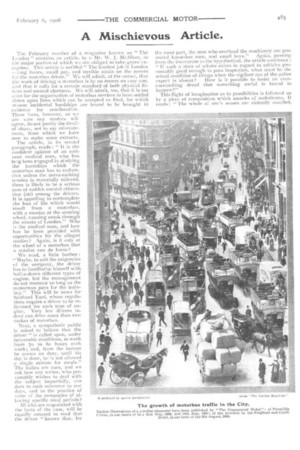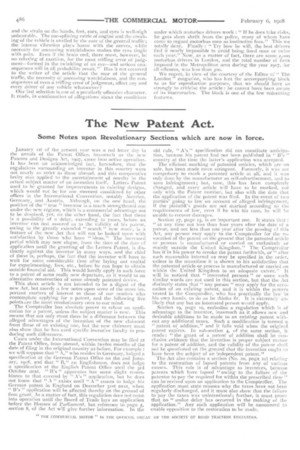A Mischievous Article.
Page 3

Page 4

If you've noticed an error in this article please click here to report it so we can fix it.
The February number of a magazine known as " The London " contains an article, by a Mr. W. J. McAtiece, to the major portion of which we are obliged to take grave exception. This article is entitled " The hardest job in London —longhours, small pay, and terrible strain on the nerves for the motorbus driver." We will admit, at the outset, that the work of driving a motorbus is by no means an easy one, and that it calls for a certain standard of both physical fit11:titi and mental alertness. We will admit, too, that it is too soon for the organisation of motorbus services to have settled down upon lines which can be accepted as final, for which reason incidental hardships are bound to be brought in
evidence for amelioration. These facts, however, as Nve are sure our readers vili agree, do not justify the tirade of abuse, net to say misstate ment, from which we have now to make some extracts. The article, in its second paragraph, reads " It is the confident opinion of an eminent medical man, who has lo.lg been engaged in studying the hardships which the motorbus man has to endure, that unless the nerve-racking tension is materially relieved, there is likely to be a serious case of sudden mental abbera tion (sic) among the drivers. It is appalling to contemplate the loss of life which would result from a motorbus, with a maniac at the steering wheel, running amok through the streets of London." Who is the medical man, and how has he been provided with opportunities for the alleged studies? Again, is it only at the wheel of a motorbus that a maniac can do harm?
We read, a little farther : "Maybe, to suit the exigencies of the company, the driver has to familiarise himself with half-a-dozen different types of engine, but the management do not murmur so long as the motorman pays for the training.'' This will be news for Scotland Yard, whose regulations require a driver to he relicensed for each type of engine. Very few drivers indeed can drive more than two makes of motorbus.
Next, a sympathetic public is asked to believe that the driver " is called upon, under favourable conditions, to work from 70 to 8o hours each week ; and, from the instant lie comes on duty, until his day is done, he is not allowed a single minute for meals." The italics are ours, and we ask how any writer, who presumably wishes to deal with the subject impartially, can dare to omit reference La rest days, and to the practice of same of the companies of allowing specific meal periods? All who are acquainted with the facts of the case, will he equally amazed to read that the driver " knows that, for the most part, the men who overhaul the machinery are pro
moted horse-bus men, and small boys." Again, passing from the inaccurate to the hypothetical, the article continues : " If such a state of affairs exists in regard to vehicles presumably good enough to. pass inspection, what must be the actual condition of things when the vigilant eye of the police expert is absent? How is it possible to resist an everencroaching dread that something awful is bound to happen ?"
This flight of imagination as to possibilities is followed up by a piece of composition which smacks of melodrama. It reads.: " The whole of one's senses are violently assailed,
and the strain on the hands, feet, ears, and eyes is well-nigh unbearable. The ear-splittingrattle of engine and the creaking of the vehicle is swelled by the roar of the general traffic; the intense yibraticn plays havoc with the nerves, while necessity for unceasing watchfulness makes the eyes tingle with pain. Even if the brain reel, there must, however, be no relaxing of exertion, for the most trifling error of judgment—formed in the twinkling of an eye—and serious consequences will in all probability result," Has it not occurred to the writer of the article that the roar of the general traffic, the necessity of unceasing watchfulness, and the consequences of even a triflingerror of judgment, affect any and every driver of any vehicle whatsoever?
Our last selection is one of a peculiarly offensive character. It reads, in continuation of allegations about the conditions
under which motorbus drivers work : " If he does take risks, he gets short shrift from the police, many of whom have come to regard motorbus men as instinctive foes." This we totally deny. Finally : " Try how he will, the best drivers find it nearlyimpossible to avoid beingfined once or twice each year." Now, as a matter of fact, there are some 2,000 motorbus drivers in London, and the total number of fines imposed in the Metropolitan area during the year 1907, for all offences, was less than 300. We regret, in view of the courtesy of the Editor of " The London " magazine, who has lent the accompanying block to us for reproduction purposes, that we should have so strongly to criticise the article : he cannot have been aware of its inaccuracies. The block is one of the few redeemingfeatures.


















